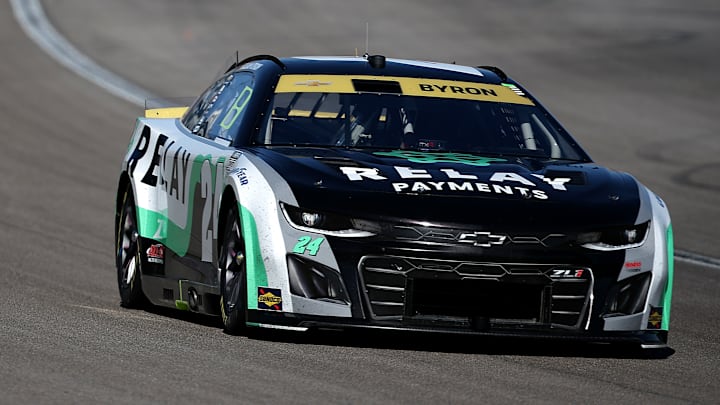Denny Hamlin won the South Point 400 at Las Vegas Motor Speedway on Sunday, earning his 60th career win and punching his ticket to the NASCAR Cup Series' Championship 4. But what everybody is talking about is a wreck that changed the whole race – and possibly the season.
With 32 laps to go, Ty Dillon abruptly slowed down to make a green-flag pit stop without signaling that he was pitting. Playoff contender William Byron, who was running second and had just lost the lead to Kyle Larson, slammed into him from behind. He finished 36th and now sits 15 points behind the cut line to advance for a shot at a title.
But playoffs aside, Byron went from having a 27-point lead over Ryan Blaney in the full-season standings to being tied for the lead with Larson. Yet apparently only one of these things is bad.
All of a sudden, fans acknowledge NASCAR's unfair nature
But only when it fits the narrative.
It's playoff time, which means that after 26 races of "whoever is leading the points is the most deserving champion, no questions asked", now drivers are suddenly allowed to be unlucky and it's not fair when DNFs hamper their title quest.
If you happened to be scrolling the NASCAR circles of X after Byron's wreck, every reaction you saw likely related to one of either two things. First, there was the usual dragging of the playoff format because of the adversity he now faces through no fault of his own. Go right ahead. No one will argue with you there.
Then, there was our weekly "LOOK AT WHAT THEY TOOK FROM US!" nostalgia-glazing of the full-season points battle due to how close it would be now (that is, assuming everyone would race the same way, which they wouldn't).
It's important to note that this narrative always alternates between the actual full-season points and the Winston Cup-era Latford points system, based on whichever one is closer and therefore provides an easier opportunity to dunk on the playoffs.
So, hold on a minute: is Byron losing a bunch of points because of a 35th-place driver's mistake unfair or not? It can't be both ways.
"But he still has a good shot to win the full-season points!"
Sure, and if he falls just a few markers short, then Dillon making one of the most boneheaded moves of the season will be the difference.
If it costs him a playoff championship, then it's a miscarriage of justice. But if it costs him the make-believe full-season points title that fans treat as their one and only correct way, then it'll be "he didn't deserve it anyway."
Of course, if we're playing the luck game, then Ryan Blaney would like a word. He's had eight DNFs this year completely beyond his control, including a flat tire on Sunday. He's been so good when he's gotten the results to match his performance that he's still only 45 points out of the full-season lead.
There's your best driver of 2025. Yet, if he wins at Talladega Superspeedway next week or Martinsville Raceway the week after, we'll hear "Playoffs bad! Penske devil magic again! He's too inconsistent!"
That is, unless he manages to make up those 45 full season points he never deserved to lose in the first place.
All in all, the moral of the story is that no matter how you design a points format, it's going to be prone to luck deciding the championship. It's just the nature of the sport.
There are a billion different little things that happen over the course of a season that take the control out of the drivers' hands and lead to results that don't reflect performance throughout a race. Not to mention, different ways of distributing points will give you different champions.
At the end of the day, it's why the best way to measure performance is with your eyes. The more fans can take a subjective approach to determining a season's best driver instead of treating any points format as a one-size-fits-all holy beacon of truth, the better.
